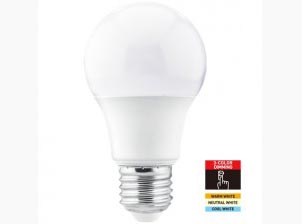
What are the pros and cons of LED light bulbs?
Pros
1. Energy Efficiency
Lower Energy Consumption: LEDs use significantly less electricity compared to incandescent and fluorescent bulbs, which translates to lower energy bills.Higher Lumens per Watt: They provide more light per unit of electricity.
2. Longevity
Long Lifespan: LED bulbs can last up to 25,000 hours or more, significantly longer than traditional bulbs.
3. Durability
Robust Design: LEDs are more resistant to shocks, vibrations, and external impacts due to their solid-state construction.
4. Environmental Impact
Eco-Friendly: LEDs do not contain mercury and have a smaller carbon footprint.
Recyclable: Many components of LED bulbs can be recycled.
5. Instant Lighting
Immediate Full Brightness: LEDs light up instantly without the warm-up time required by some other types of bulbs.
6. Versatility
Wide Range of Colors and Temperatures: Available in various color temperatures and hues, suitable for different settings.Dimmability: Many LED bulbs are dimmable, offering better control over lighting ambiance.
7. Reduced Heat Emission
Cooler Operation: LEDs emit very little heat compared to incandescent bulbs, making them safer and reducing cooling costs in enclosed spaces.
Cons
1. Higher Initial Cost
Upfront Investment: LED bulbs tend to be more expensive initially compared to incandescent or fluorescent bulbs.
2. Compatibility Issues
Dimming Compatibility: Not all LED bulbs are compatible with existing dimmer switches, requiring potential additional costs for new dimmers.
3. Light Quality Variability
Color Rendering Index (CRI): Some cheaper LEDs may have a lower CRI, resulting in less accurate color representation.
4. Heat Sensitivity
Performance in Enclosed Fixtures: LEDs can overheat if not properly ventilated, potentially reducing their lifespan and efficiency.
5. Blue Light Emission
Potential Health Impact: High levels of blue light emitted by LEDs can affect sleep patterns and eye health, although this is more relevant for screens than for most household bulbs.
LED light bulbs offer numerous advantages, particularly in terms of energy efficiency, longevity, and versatility. However, their higher initial cost and potential compatibility issues can be drawbacks. Overall, they are a strong choice for both residential and commercial lighting needs, balancing long-term savings and environmental benefits against the initial investment.
Can LED bulbs be used in any light fixture?
What is the LED bulb equivalent to 60 watt?
What LED bulb replaces 100 watt?
How do I know which LED bulb to buy?
Are LED bulbs worth the money?
Are LED bulbs cheaper on electricity?
What are the three types of LED light bulbs?
Why are LED light bulbs better?
Can LED bulbs be used in any light fixture?
What is the difference between LED and normal bulbs?

